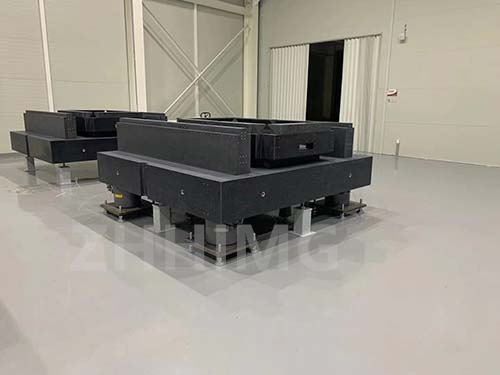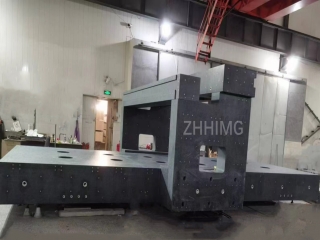In the field of semiconductor manufacturing, which pursues ultimate precision, the coefficient of thermal expansion is one of the core parameters that affect product quality and production stability. Throughout the entire process from photolithography, etching to packaging, the differences in the thermal expansion coefficients of materials can interfere with manufacturing accuracy in various ways. However, the granite base, with its ultra-low thermal expansion coefficient, has become the key to solving this problem.
Lithography process: Thermal deformation causes pattern deviation
Photolithography is a core step in semiconductor manufacturing. Through a photolithography machine, the circuit patterns on the mask are transferred to the surface of the wafer coated with photoresist. During this process, the thermal management inside the photolithography machine and the stability of the worktable are of vital importance. Take traditional metal materials as an example. Their coefficient of thermal expansion is approximately 12×10⁻⁶/℃. During the operation of the photolithography machine, the heat generated by the laser light source, optical lenses and mechanical components will cause the equipment temperature to rise by 5-10 ℃. If the lithography machine's worktable uses a metal base, a 1-meter-long base may cause an expansion deformation of 60-120 μm, which will lead to a shift in the relative position between the mask and the wafer.
In advanced manufacturing processes (such as 3nm and 2nm), the transistor spacing is only a few nanometers. Such a tiny thermal deformation is sufficient to cause the photolithography pattern to be misaligned, leading to abnormal transistor connections, short circuits or open circuits, and other issues, directly resulting in the failure of chip functions. The thermal expansion coefficient of the granite base is as low as 0.01μm/°C (i.e., (1-2) ×10⁻⁶/℃), and the deformation under the same temperature change is only 1/10-1/5 of that of metal. It can provide a stable load-bearing platform for the photolithography machine, ensuring the precise transfer of the photolithography pattern and significantly improving the yield of chip manufacturing.

Etching and deposition: Affect the dimensional accuracy of the structure
Etching and deposition are the key processes for constructing three-dimensional circuit structures on the wafer surface. During the etching process, the reactive gas undergoes a chemical reaction with the surface material of the wafer. Meanwhile, components such as the RF power supply and gas flow control inside the equipment generate heat, causing the temperature of the wafer and the equipment components to rise. If the coefficient of thermal expansion of the wafer carrier or equipment base does not match that of the wafer (the coefficient of thermal expansion of silicon material is approximately 2.6×10⁻⁶/℃), thermal stress will be generated when the temperature changes, which may cause tiny cracks or warping on the surface of the wafer.
This kind of deformation will affect the etching depth and the verticality of the side wall, causing the dimensions of the etched grooves, through holes and other structures to deviate from the design requirements. Similarly, in the thin film deposition process, the difference in thermal expansion may cause internal stress in the deposited thin film, leading to problems such as cracking and peeling of the film, which affects the electrical performance and long-term reliability of the chip. The use of granite bases with a thermal expansion coefficient similar to that of silicon materials can effectively reduce thermal stress and ensure the stability and accuracy of the etching and deposition processes.
Packaging stage: Thermal mismatch causes reliability issues
In the semiconductor packaging stage, the compatibility of the thermal expansion coefficients between the chip and the packaging material (such as epoxy resin, ceramics, etc.) is of vital importance. The thermal expansion coefficient of silicon, the core material of chips, is relatively low, while that of most packaging materials is relatively high. When the temperature of the chip changes during use, thermal stress will occur between the chip and the packaging material due to the mismatch of thermal expansion coefficients.
This thermal stress, under the effect of repeated temperature cycles (such as the heating and cooling during the operation of the chip), can lead to fatigue cracking of the solder joints between the chip and the packaging substrate, or cause the bonding wires on the chip surface to fall off, ultimately resulting in the failure of the electrical connection of the chip. By choosing packaging substrate materials with a thermal expansion coefficient close to that of silicon materials and using granite test platforms with excellent thermal stability for accuracy detection during the packaging process, the problem of thermal mismatch can be effectively reduced, the reliability of packaging can be improved, and the service life of the chip can be prolonged.
Production environment control: The coordinated stability of equipment and factory buildings
In addition to directly affecting the manufacturing process, the coefficient of thermal expansion is also related to the overall environmental control of semiconductor factories. In large semiconductor production workshops, factors such as the start and stop of air conditioning systems and the heat dissipation of equipment clusters can cause fluctuations in environmental temperature. If the coefficient of thermal expansion of the factory floor, equipment bases and other infrastructure is too high, long-term temperature changes will cause the floor to crack and the equipment foundation to shift, thereby affecting the accuracy of precision equipment such as photolithography machines and etching machines.
By using granite bases as equipment supports and combining them with factory building materials with low thermal expansion coefficients, a stable production environment can be created, reducing the frequency of equipment calibration and maintenance costs caused by environmental thermal deformation, and ensuring the long-term stable operation of the semiconductor production line.
The coefficient of thermal expansion runs through the entire life cycle of semiconductor manufacturing, from material selection, process control to packaging and testing. The impact of thermal expansion needs to be strictly considered in every link. Granite bases, with their ultra-low coefficient of thermal expansion and other excellent properties, provide a stable physical foundation for semiconductor manufacturing and become an important guarantee for promoting the development of chip manufacturing processes towards higher precision.
Post time: May-20-2025

